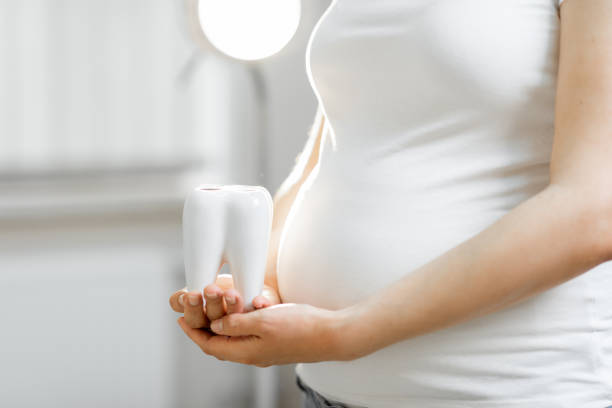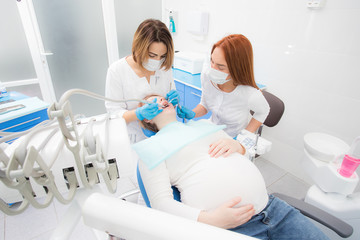Oral health for pregnancy is important to overall health. Women are encouraged to learn about oral health care before and at the beginning of their pregnancy.
Achieving optimal oral health for pregnant women affects them and their baby's health.
Where poor oral health and dental diseases have adverse outcomes on the pregnancy and the mother.
We here answered all of your questions about pregnancy and oral health.
Causes of oral diseases during pregnancy
Hormones
When sex hormones estrogen and progesterone levels increase during pregnancy, where they increase blood flow to all of your mucous membranes.
Dietary changes
Pregnant women properly eat more carbs, sweets, and fast food which is usually not healthy for oral health.
Decreased saliva production
Increased hormone levels lead to decreased saliva.
As we know decreased saliva leads to the hanging of the carbs you eat on the surface of your teeth for a longer time leading to the build-up of plaque.
Saliva acidity
The saliva is more acidic in pregnant women which increases the risk of tooth erosion and decay.
Morning sickness
is also the reason for the increase in the acidity of the oral cavity
What are the oral problems during pregnancy?
Oral lesions
Pregnancy and oral cavities are more acidic than in non-pregnant women.
Morning sickness is a common cause of oral lesions in pregnancy.
Where lax esophageal sphincter and pressure from the gravid uterus can cause or increase (GRED) acid reflux.
How to manage?
It can be treated by rinsing the mouth with a teaspoon of baking soda in a cup of water after vomiting.
And brushing your teeth with a soft toothbrush to reduce the risk of enamel damage.
Also, wash your teeth with fluoride mouthwash to protect roded or sensitive teeth.
Caries
Is a disease where carbohydrate is fermented by oral bacteria into acids that demineralize enamel.
Early caries appear as a white demineralized area after some time and break into brownie cavitations.
How to avoid it?
You can decrease the risk of having caries by brushing your teeth twice daily with fluoride toothpaste.
Limiting sugary food, and untreated caries made it to oral abscesses and facial cellulitis.
Loose teeth
Loose is temporary during pregnancy, even if there is no gum disease.
It may occur due to increased levels of progesterone and estrogen that affect the ligaments and bones that support the teeth.
You should know that the condition is temporary, and it alone will be solved.
Gingivitis
Gingivitis is the most common oral disease in pregnancy, it is inflammation of the superficial gum tissue.
It is usually increased during pregnancy due to fluctuations in estrogen and progesterone levels and decreased immune response.
How to avoid it?
Brushing and flossing the teeth and doing oral hygiene measures may decrease gingivitis from occurring during pregnancy.
Periodontal disease
If gingivitis is not treated it may lead to periodontal disease, which is a destructive inflammation in the periodontium.
Infection in the gums and problems with the bones that support the teeth also could lead to bacteremia which is bacteria in the bloodstream.
Women with pre-existing periodontal disease could be worsened during pregnancy.
How to avoid it?
The American Academy of Periodontology recommends every pregnant woman or planning to get pregnant undergo a periodontal examination.
Oral tumours
Pyogenic granulomas are another name for oral tumors.
They sound dangerous, but they are harmless and unusually go away when the baby comes.
These red, raw swellings that take place in between teeth are usually related to excess plaques.
Bleeding gums
Bleeding gum could be an early sign of pregnancy, it usually increases in the second trimester and may occur with gingivitis.
Don’t worry you may want to brush your teeth.

Tips about oral health during pregnancy
Every pregnant woman should be assessed for dental hygiene habits.
Starting from the first trimester about 14 weeks pregnant is the most critical period.
Avoid any dental treatment appointments from the middle of the third trimester.
The following are the most important tips for oral health during pregnancy:
- Educate the pregnant woman about maternal oral changes during pregnancy.
-Teach the pregnant woman instructions about oral hygiene and plaque control.
-The mother should be taught routine, brushing and flossing and to avoid excessive amounts of sugary drinks and snacks.
-Brushing your teeth using a toothbrush with soft bristles twice a day after meals and flossing your teeth once a day.
5-If you are in the first trimester suffering from morning sickness and can’t brush your teeth.
Use antacids or wash your mouth with baking soda by mixing 1 teaspoon of baking soda in 1 cup of water and using it as a mouthwash.
6-During the second-trimester dental procedures could be scheduled if necessary as scaling, polishing, and curettage.
- In the third trimester there is no risk to the fetus, but the mother may not be comfortable.
- Dental appointments should be scheduled with appropriate positioning of the chair in position comfort for the mother avoiding supine hypotension.
9-Visit your dentist for a dental checkup every six months even during pregnancy.
- Eating healthy food includes fruits, vegetables, whole grain wheat, and low-fat dairy products avoiding extra sugary snacks and limiting the carbs.
- Quit smoking if you smoke.
A dental x-ray during pregnancy
A dental x-ray is necessary to diagnose and treat most oral conditions.
In pregnancy, it is avoided to make any dental x-ray in the first trimester.
In the third trimester dental x-ray could be done if necessary by decreasing the radiation exposure to the baby by using a lead apron and thyroid collar.

Treatment of oral problems in pregnancy
To maintain oral health for pregnancy some oral diseases are solved on their own and some need treatment.
Treatments that are safe during pregnancy are:
- Antibiotics if there are infections the dentist will prescribe the antibiotic that fits the pregnancy.
- Pain relievers that could be taken in pregnancy.
- Local anesthesia is used to decrease or prevent pain.
- Any dental treatment should be healed if necessary in the second trimester or at the beginning of the third trimester.
Summary:
Oral health for pregnancy is a must to decrease the risk of any oral problem to occur.
Fluctuation of pregnancy hormones is the main cause of most oral problems.
Don’t worry most of the oral problems are solved on their own once delivery occurs, just listen to your dentist and learn about the best oral health routine that fits you.
Read more about:


You must be logged in to post a comment.